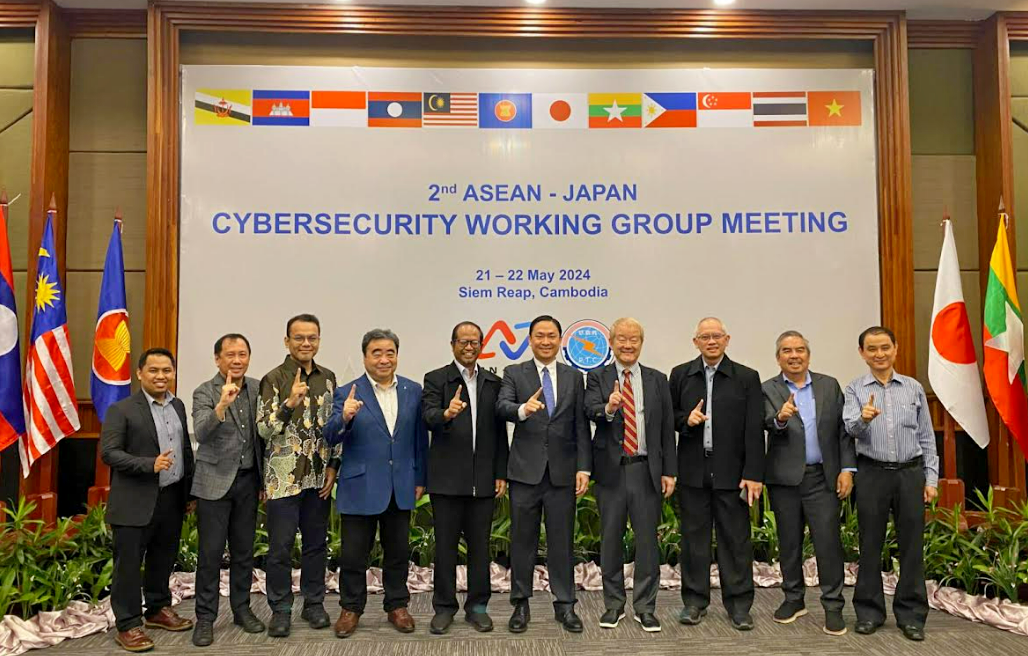Unified Asia Approach To Cybersecurity: Public-Private Partnership To Combat Cyber Threats
Siem Reap, Cambodia, May 23, 2024 – Leaders from the Philippine
Cybersecurity and Data Protection Communities of Practice, attending the
ASEAN-Japan Cybersecurity Technical Working Group joint meeting, emphasized
the critical need for unified efforts between government and private sector
entities to combat cyber threats across the Asia region.
Emphasizing a Unified Approach
Lito Averia, President of the Philippine Computer Emergency Response Team
(PH-CERT), highlighted the necessity for a cohesive "whole-of-Asia" and
"whole-of-society" approach. "A harmonized strategy among government and
private sector leaders in ASEAN, Japan, and other regional countries is
essential to combat cyber threats," Averia stated. "The shared nature of these
threats, which target digital infrastructure and Critical Information
Infrastructure (CII) across nations, underscores the urgency of this
collaboration."

Officers and Board Members of the ASEAN-Japan Cybersecurity Community Alliance (AJCCA) attended the 2nd ASEAN-Japan Cybersecurity Working Group Meeting on May 22, 2024, in Siem Reap, Cambodia, to discuss cybersecurity partnerships and joint initiatives in the region with their government counterparts in ASEAN. In the photo are (from L-R): Mr. Farwan, Chairman of the Indonesia Network Security Association (IdNSA); Mr. Sam Jacoba, Vice President of the Philippine Computer Emergency Response Team (PH-CERT); Mr. TS Tahrizi Tahreb, Co-Founder of RawSEC Malaysia Cybersecurity Community; Dr. Hiroshi Esaki, President of the Japan Network Security Association (JNSA); Dr. Rudi Lumanto, AJCCA Chairman; Phannarith Ou, President of the Information Sharing and Analytic Center (ISAC) of Cambodia; Seiichi Ito, Chairman of the International Relations Committee of JNSA; Dr. Mohammad Salman of the University of Indonesia; Lito Averia, Founder and President of PH-CERT; and Dr. Khanh Vu, Vice President of the Vietnam Information.
Proposing an Information Exchange Network
Sam Jacoba, Founding President of the National Association of Data Protection
Officers of the Philippines (NADPOP) and Vice President of PH-CERT, discussed
the increasing frequency of cyber attacks on government digital ecosystems and
CIIs. He proposed the establishment of an Information Exchange Network,
envisioned as a cyber weather station to receive, verify, and disseminate
threat alerts across the region. "In addition to creating robust
information-sharing frameworks, it is imperative that countries continue to
develop and upskill their cybersecurity workforce," Jacoba noted.
Addressing the Workforce Gap
For the Philippines, PH-CERT and NADPOP estimate a need for 180,000 trained
and validated cybersecurity professionals to protect the nation's CIIs
effectively. They also emphasized a similar requirement for professionals
trained in Data Privacy, Governance, Risk, and Compliance (GRC) to ensure
comprehensive protection and resilience against cyber threats.
Participation in the AJCCA Meeting
PH-CERT and NADPOP are participating in the fifth board meeting of the
newly-formed ASEAN-Japan Cybersecurity Community Alliance (AJCCA). This event,
occurring alongside the 2024 2nd ASEAN-Japan Cybersecurity Working Group
Meeting, is organized and hosted by the Cambodian government.
Focus on Regional Collaboration
The 2nd Joint Government-Industry-Academia (J-GIA) CA meeting between AJCCA
and government cybersecurity representatives from ASEAN and Japan underscores
the critical importance of regional collaboration. The focus is on the five
pillars of the Global Cybersecurity Index (GCI), published by the United
Nations International Telecommunications Union (ITU): Legal, Technical,
Organizational, Capacity Building, and Cooperation.
Future Initiatives
Averia and Jacoba announced that forthcoming joint initiatives between
government and private sector entities will be a primary outcome of these
quarterly regional meetings. These initiatives aim to address key gaps in the
GCI Cybersecurity Pillars for each country and the region as a whole.
Benefiting Citizens
"When government and private sector organizations collaborate to combat cyber
threats, the primary beneficiaries are the citizens," Averia emphasized. "We
are already witnessing the positive dynamics and impact of this cybersecurity
community within the region."
Jacoba added, "These meetings are fostering a regional force for good,
providing a shield for countries and citizens against threat actors, who are
increasingly using AI in their attacks. We invite all active Communities of
Practice in the region to collaborate with AJCCA, as threat actors are highly
organized. In these times, a whole-of-region, whole-of-society, and
whole-of-community cooperation is essential to effectively respond to cyber
threats."
About PH-CERT
Organized at the turn of the century, the Philippine Computer Emergency
Response Team (PH-CERT) is a non-stock, non-profit organization
institutionalized in March 2001 by the Securities and Exchange Commission
(SEC) of the Republic of the Philippines. Its primary purpose and advocacy
include increasing awareness of Information Security and Cybersecurity,
developing an inclusive InfoSec and Cybersecurity workforce, and adopting
InfoSec and Cybersecurity standards and best practices to uplift their
practice in the Philippines and the Asia-Pacific region.
About NADPOP
The National Association of Data Protection Officers of the Philippines
(NADPOP) is the first community of Data Privacy, Data Protection, and
Cybersecurity practitioners in the Philippines. Established by the SEC in
2018, NADPOP is a non-stock, non-profit organization with a vision of a Cyber,
AI, and Data Resilient Philippines. It aims to transform the Philippines into
a Global Center of Excellence in Data Privacy, Data Protection, and
Cybersecurity by inspiring, empowering, and prospering Data Privacy, Data
Protection, and Cybersecurity professionals in the Philippines and the
Asia-Pacific region.
About AJCCA
The ASEAN-Japan Cybersecurity Community Alliance (AJCCA) is a collaborative
initiative formed by nine leading cybersecurity communities from ASEAN nations
and Japan. AJCCA is dedicated to enhancing cybersecurity capabilities,
information sharing, and mutual support among its member nations to address
the evolving challenges in the digital landscape. AJCCA’s vision is a dynamic
and resilient cybersecurity community in the region through trustworthy and
respectful collaboration.
Labels:
ASEAN-Japan Cybersecurity Technical Working Group
Cybersecurity
Philippine Cybersecurity and Data Protection Communities of Practice




.jpg)
No comments:
Let me know your thoughts on this TechPinas article.